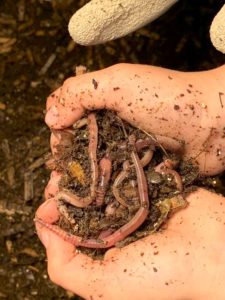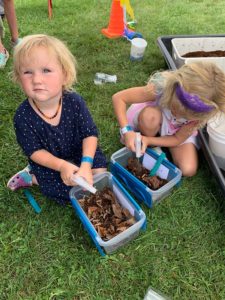By Ethan Weinstein
RUTLAND—Some kids like to collect baseball cards, others play video games. Lyric, 9, and her brother, Luca, 6, of Little Diggers Worm Farm, have a different hobby: worms.
Along with their grandmother, Kim Ray, the sibling team created Little Diggers Worm Farm, selling mini worm farm kits, vermicomposting starter kits, worm casting compost, as well as worms themselves for fishing and composting.
The duo first began making worm farms back in 2019, but the crew did not start Little Diggers until February of 2021.

of European Night crawlers
ENC (Eisenia Hortensis)
grown in their home worm bins.
“When we went to grandma’s house, we always spent most of the day outside. So I guess we found some worms and we got really interested in them. And so then we wanted to start a worm farm,” Lyric said of Little Diggers origin.
“We had no idea how this was all gonna go,” said Ray of starting Little Diggers. “Kids seem to really love them [worms].”
Thanks in part to Vermont’s ban on food scraps, which took effect July 2020, the worm farm business has taken off.
On Friday, Lyric, Luca and Kim hosted two create-your-own worm farm informational sessions at the State Fair in Rutland, sponsored by the Master Gardeners and Rutland County Solid Waste.
With the help of grandma Kim, Lyric and Luca walked their audience of kids their age and their parents through a crash course in worms and vermicomposting. They taught their peers the parts a worm, the events in a worm’s lifecycle, and even used a microscope to show the lifeforms hidden in worm-improved soil.
Worms “help the soil become really good for plants,” Lyric explained.
Brian Sales, outreach coordinator for the Rutland County Solid Waste District was excited to sponsor the event. “Having kids leading the class, I think it’s pretty cool,” he said.
“As far as composting is concerned, [vermicomposting] is the easiest, the cleanest way to do it, if you do it properly,” Sales added.

in the making. Courtesy Little Diggers Worm Farm
The kids in attendance got a kick out of the make-your-own worm farm segment of the presentation. Lyric and Luca talked through all the necessary components — cocoa core, cardboard, eggshells, worm food, and water — even measuring each farm’s temperature, moisture level, and pH to ensure an ideal habitat. Worms like food scraps that are not acidic. Watermelon rinds and banana peels are two favorites.
At the end of the session, each kid walked away with their own mini worm farm and 10 worms. If all goes according to plan, those worms will reproduce, and the worm farms can expand.
Asked what it’s like teaching other kids her age about worms, Lyric said, “I like it because then other people get to learn new things. And so they can have their own worm farm and enjoy it, too.”
For more information, visit littlediggerswormfarm.com.




